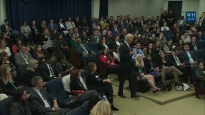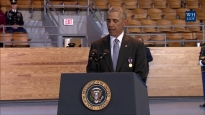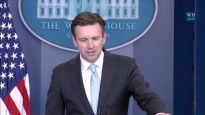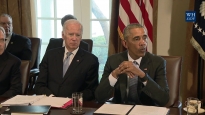President Obama Speaks to the Press
May 30, 2014 | 22:17 | Public Domain
President Obama makes a statement to the press and announces the resignation of Secretary of Veterans Affairs Eric Shinseki.
Statement by the President
James S. Brady Press Briefing Room
11:17 A.M. EDT
THE PRESIDENT: Good morning, everybody. A few minutes ago, Secretary Shinseki and Rob Nabors, who I’ve temporarily assigned to work with the VA, presented me with the department’s initial review of VA facilities nationwide. And what they’ve found is that the misconduct has not been limited to a few VA facilities, but many across the country. That’s totally unacceptable. Our veterans deserve the best. They’ve earned it. Last week, I said that if we found misconduct, it would be punished. And I meant it.
Secretary Shinseki has now begun the process of firing many of the people responsible, including senior leaders at the Phoenix VA. He’s canceled any possible performance bonuses this year for VHA senior executives. And he has ordered the VA to personally contact every veteran in Phoenix waiting for appointments to get them the care that they need and that they deserve.
This morning, I think some of you also heard Ric take a truly remarkable action -- in public remarks, he took responsibility for the conduct of those facilities, and apologized to his fellow veterans and to the American people. And a few minutes ago, Secretary Shinseki offered me his own resignation. With considerable regret, I accepted.
Ric Shinseki has served his country with honor for nearly 50 years. He did two tours of combat in Vietnam -- he’s a veteran who left a part of himself on the battlefield. He rose to command the First Cavalry Division, served as Army Chief of Staff, and has never been afraid to speak truth to power.
As Secretary at the VA, he presided over record investments in our veterans -- enrolling 2 million new veterans in health care, delivering disability pay to more Vietnam veterans exposed to Agent Orange, making it easier for veterans with post-traumatic stress, mental health issues and traumatic brain injury to get treatment, improving care for our women veterans. At the same time, he helped reduce veteran homelessness, and helped more than 1 million veterans, servicemembers and their families pursue their education under the Post-9/11 GI Bill.
So Ric’s commitment to our veterans is unquestioned. His service to our country is exemplary. I am grateful for his service, as are many veterans across the country. He has worked hard to investigate and identify the problems with access to care, but as he told me this morning, the VA needs new leadership to address them. He does not want to be a distraction, because his priority is to fix the problem and make sure our vets are getting the care that they need. That was Ric’s judgment on behalf of his fellow veterans. And I agree. We don't have time for distractions. We need to fix the problem.
For now, the leader that will help move us forward is Sloan Gibson, who will take on the reins as Acting Secretary. Sloan became Deputy Secretary at the VA just three months ago, but he, too, has devoted his life to serving our country and our veterans. His grandfather fought on the front lines of World War I. His father was a tail-gunner in World War II. Sloan graduated from West Point, earned his Airborne and Ranger qualifications, and served in the infantry. And most recently, he was President and CEO of the USO, which does a remarkable job supporting our men and women at war, their families, our wounded warriors, and families of the fallen.
So all told, Sloan has 20 years of private sector and nonprofit experience that he brings to bear on our ongoing work to build a 21st century VA. And I’m grateful that he is willing to take on this task.
I met with Sloan after I met with Ric this morning, and made it clear that reforms should not wait. They need to proceed immediately. I’ve also asked Rob Nabors to stay at the VA temporarily to help Sloan and the department through this transition, and to complete his own review of the VHA. In the meantime, we’re going to look diligently for a new permanent VA Secretary and we hope to confirm that successor and fill that post as soon as possible.
We’re going to do right by our veterans across the board, as long as it takes. We're not going to stop working to make sure that they get the care, the benefit, and the opportunities that they’ve earned and they deserve. I said we wouldn’t tolerate misconduct, and we will not. I said that we have to do better, and we will. There are too many veterans receiving care right now who deserve all of our best efforts -- and an honest assessment if something is not working.
This week, I visited some of our men and women in uniform at different stages of their service: our newest Army officers who graduated from West Point; our troops currently serving in Afghanistan; our veterans and our military families at Arlington. And what I saw is what I’ve seen in every single servicemember, veteran, and military spouse that I have had the privilege to meet -- a selfless, clear-eyed commitment to serving their country the best way that they know how. They’re the best that our country has to offer. They do their duty. They expect us to do ours.
So, today, I want every man and woman who’s served under our flag to know -- whether your tour has been over for decades, or it’s just about to end -- we will never stop working to do right by you and your families.
Let me take a couple questions. Leo Shane from Military Times.
Q Mr. President, what changed in your opinion of Secretary Shinseki in the last few days? You had said you had confidence in him -- even him coming in today and saying it was time for him to resign. What made the difference in your mind?
THE PRESIDENT: Ric’s judgment. I think his belief that he would be a distraction from the task at hand, which is to make sure that what’s broken gets fixed so that his fellow veterans are getting the services that they need.
I want to reiterate, he is a very good man. I don’t just mean he’s an accomplished man. I don’t just mean that he’s been an outstanding soldier. He’s a good person who’s done exemplary work on our behalf. And under his leadership, we have seen more progress on more fronts at the VA and a bigger investment in the VA than just about any other VA Secretary: Cut veterans’ homelessness by 24 percent; brought in folks who had been exposed to Agent Orange who had been waiting for decades to get the services and benefits that they had earned; making sure that post-traumatic stress disorder and traumatic brain injury was dealt with in a serious way; making sure we had facilities for our women vets, who all too often weren’t receiving the kind of specialized services that they needed.
So he’s been a champion of our veterans. And where there’s problems, he has been ready and willing to get in there and fix them. So with the disability backlog that had shot up as a consequence of the admission of the Agent Orange veterans, as well as making it easier to apply for post-traumatic stress disorder disability claims -- when it spiked, he went at it in a systematic way, and we’ve now cut it by 50 percent over the course of the last year or so.
He’s not adverse to admitting where there’s a problem and going after it. But we occupy a -- not just an environment that calls for management fixes, we’ve also got to deal with Congress and you guys. And I think Ric’s judgment that he could not carry out the next stages of reform without being a distraction himself.
And so my assessment was, unfortunately, that he was right. I regret that he has to resign under these circumstances, but I also have confidence in Sloan, and I share Ric Shinseki’s assessment that the number-one priority is making sure that problems get fixed so that if there’s a veteran out there who needs help that they’re getting a schedule and they’re able to come in and see a doctor, and that if there are facilities that don’t have enough doctors or do not have enough nurses or do not have enough space, that that information immediately gets in the hands of decision-makers, all the way up to me and all the way to Congress, so that we can get more resources in there to help folks.
And that seems to be the biggest problem. I think that’s the thing that offended Secretary Shinseki the most during the course of this process. He described to me the fact that when he was in theater, he might have to order an attack just based on a phone call from some 20-something-year-old corporal, and he’s got to trust that he’s getting good information -- and it’s life or death. And I think he is deeply disappointed in the fact that bad news did not get to him, and that the structures weren’t in place for him to identify this problem quickly and fix it. His priority now is to make sure that happens, and he felt like new leadership would be -- would serve our veterans best. And I agree with him.
Phil Mattingly.
Q Thank you, Mr. President. Based on the audit, at least the early stage audit the Secretary presented to you, is there a sense that there was criminal wrongdoing? And I guess more broadly, how much responsibility do you personally bear, as this being an issue you campaigned on and cared about deeply -- you said cared about deeply during your administration -- now that we’re at this point?
THE PRESIDENT: Well, I will leave it up to the Justice Department to make determinations in terms of whether there’s been criminal wrongdoing. In terms of responsibility, as I’ve said before, this is my administration; I always take responsibility for whatever happens. And this is an area that I have a particular concern with. This predates my presidency. When I was in the Senate, I was on the Veterans Affairs Committee. I heard firsthand veterans who were not getting the kinds of services and benefits that they had earned. And I pledged that if I had the privilege of serving as Commander-in-Chief and President, that we would fix it.
The VA is a big organization that has had problems for a very long time -- in some cases, management problems; in some cases, funding problems. And so what we’ve tried to do is to systematically go after the problems that we were aware of and fix them. And where we have seen our veterans not being properly served -- whether it was too many homeless veterans, or a disability claims process that was taking too long -- we would go at it and chip away at it and fix it.
When it came to funding, we’ve increased funding for VA services in an unprecedented fashion, because we understood that it’s not enough just to give lip service to our veterans, but not being willing to put our money where our mouth is.
And so what I can say confidently is that this has been a priority, it’s been a priority reflected in my budget, and that in terms of managing the VA, where we have seen a problem, where we have been aware of a problem, we have gone after it and fixed it, and have been able to make significant progress.
But what is absolutely clear is this one, this issue of scheduling, is one that the reporting systems inside of the VHA did not surface to the level where Ric was aware of it or we were able to see it. This was not something that we were hearing when I was traveling around the country -- the particular issues of schedule. And what we’re going to have to do -- part of the review is going to have to be to see how do we make sure that we get information about systems that aren’t working.
I just was talking to Rob Nabors, and he described to me, for example, just in very specific detail, how in some of these facilities you’ve got computer systems for scheduling that date back to the ‘90s; situations in which one scheduler might have to look at four or five different screens to figure out where there’s a slot and where there might be a doctor available; situations in which they’re manually passing requests for an appointment over to somebody else, who’s then inputting them. Right? So you have in many cases old systems, broken-down systems.
This is stuff that is eminently fixable, but we’ve got to know about it. And the big concern that I’ve got, and what I’m going to be interested in finding out, is how is it that in a number of these facilities, if, in fact, you have veterans who are waiting too long for an appointment, that that information didn’t surface sooner so that we could go ahead and fix it.
One last point I want to make on this: When veterans have gotten access to the system, the health care itself that they are receiving has gotten high marks from our veterans service organizations and the veterans themselves. So I think it’s important to keep in mind that what the review indicates so far, at least, is that there have been great strides made in the actual care provided to veterans. The challenge is getting veterans into the door, particularly for their first appointment, in some cases, and where they don’t have an established relationship with a doctor and they’re not in the system.
Part of that is going to be technology. Part of that is management. But as Ric Shinseki himself indicated, there is a need for a change in culture within the VHA, and perhaps the VHA as a whole -- or the VA as a whole that makes sure that bad news gets surfaced quickly so that things can be fixed. And I know that was the attitude of Secretary Shinseki, and that was what he communicated to folks under him but they didn’t execute. And that’s a problem.
Christi Parsons, last question.
Q Thank you, Mr. President. You said that it was the General’s own judgment that made the decision for you here. If I remember correctly, Secretary Sebelius offered you her resignation after healthcare.gov failed, and you declined to take it. So I wonder if there’s a little bit of scapegoating taking place here.
THE PRESIDENT: Meaning?
Q Meaning, I mean, the dysfunction within the department seems to have been very deep and very widespread.
THE PRESIDENT: Yes.
Q So is lopping off the head of it really the best step to take going forward here? What I’m asking is, is there a political reason for removing him other than going straight to the problem of the bureaucracy?
THE PRESIDENT: Well, the distractions that Ric refers to in part are political. He needs to be -- at this stage, what I want is somebody at the VA who is not spending time outside of solving problems for the veterans. I want somebody who’s spending every minute of every day figuring out have we called every single veteran that’s waiting; have they gotten a schedule; are we fixing the system; what kind of new technology do we need; have we made a realistic assessment of how long the wait times are right now, and how are we going to bring those wait times down in certain facilities where the wait times are too long; if we need more money, how much more money do we need to ask from Congress, and how am I going to make sure Congress delivers on that additional funding.
That’s what I want somebody at the VA focused on. Not how are they getting second-guessed, and speculations about their futures, and so forth and so on. And that was what Ric agreed to, as well.
With respect to Secretary Sebelius, at the time I thought it would be a distraction to replace somebody at HHS at a time when we were trying to fix that system. And I wanted to just stay focused because I knew that if we bear down on it and we got folks enrolled that it would work.
So in each instance, my primary decision is based on, how can I deliver service to the American people, and in this case, how can I deliver for our veterans. And because they are people of integrity, I think in both the cases of Secretary Sebelius, but certainly in the case here of Ric Shinseki, they’ve got the same priority. They’re view is, what is it that is going to best deliver on behalf of folks who, as Ric said this morning, have been let down.
Q I remember at the time that you felt she had so much knowledge about what had gone wrong that you couldn’t afford to lose that.
THE PRESIDENT: Right.
Q Does somebody with three months in leadership at the department have the capacity to attack the problem quickly now?
THE PRESIDENT: Well, we’re going to need a new VA Secretary. So Sloan is acting. Sloan, I think, would be the first to acknowledge that he’s going to have a learning curve that he’s got to deal with.
But the nature of the problem that has surfaced and has been the cause of this attention is one that we can start tackling right away, and without completely transforming the system we can immediately make some progress. We’re going to have some longer-term issues that we’re going to have to take care of.
So my first step is everybody who’s out there waiting, get them an appointment. If we need more doctors, let’s figure out how we can surge some doctors in there to make sure that they’re getting the help that they need. What I wanted to make sure of then is that even if it’s still patchwork, how do we make sure that there is no slippage between somebody making a phone call and them getting an appointment scheduled. And let’s have a realistic time for how soon they’re going to get an appointment. Those are things that don’t require rocket science. It requires execution; it requires discipline; it requires focus. Those are things that Sloan has.
There are then going to be some broader issues that we’re going to have to tackle. The information systems inside the VHA, those are probably going to have to be changed. That will cost some money, that will take some time, and it will have to be implemented. I think there are going to have to be some changes in the culture within the VHA, because as I said, they’re providing very good service, medical treatment to our veterans when they get in the system, but they don’t have, apparently, the state-of-the-art operations that you would want to see, for example, in a major medical center or hospital.
Now, keep in mind, those of us who are outside of the VA system and try to get an appointment with the doctor in the private sector, and try to get an appointment for -- a schedule for a hospital visit, there are probably some wait times as well. So part of what we have to do is figure out what are realistic benchmarks for the system.
And my suspicion is that with not only all the veterans from Iraq and Afghanistan coming back, but also the aging of our Vietnam vets who may have more chronic illnesses, may need more visits -- we may need to get more doctors, and we may need to get more nurses. And that’s going to cost some money, which means that’s going to have to be reflected in a Veterans Affairs budget, which I have consistently increased. Even during fiscally tight times, there’s been no area where I’ve put more priority than making sure that we’re delivering the kind of budget that’s necessary to make sure our veterans are being served, but it may still not be enough.
And we’re going to -- but before we start spending more money, our first job is let’s take care of some basic management issues that I think can be fixed.
All right? Thank you.
END
11:38 A.M. EDT
|
January 6, 2017
|
January 6, 2017
|
January 5, 2017
|
January 5, 2017
|
|
January 4, 2017
|
January 4, 2017
|
January 4, 2017
|
January 4, 2017
|
- &lsaquo previous
- 1
- 2
- 3
- 4
- 5
- 6
- 7
- 8
- 9
- …
- next &rsaquo







